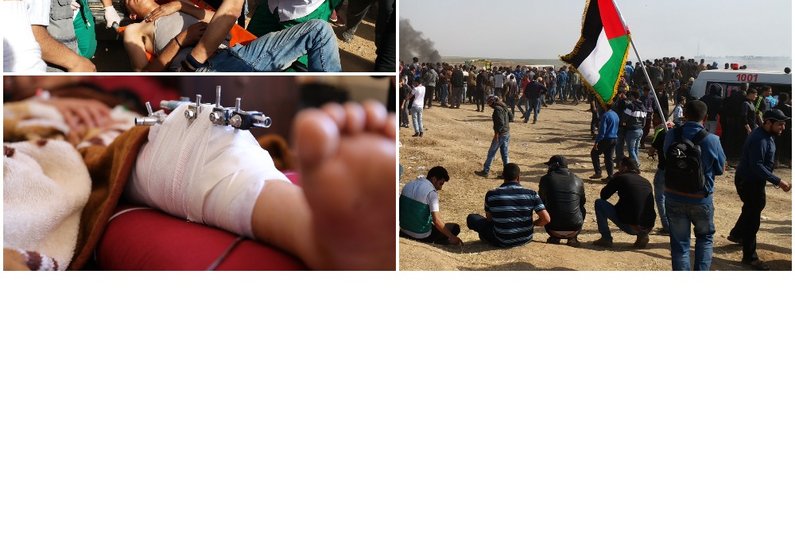On one-year anniversary of “Great March of Return”, MAP warns urgent international action needed to protect lives

One year ago, Friday 30 March 2018, the “Great March of Return” began in Gaza. Initially intended to last for six weeks, but continuing today, this series of widespread civil society-organised demonstrations in Gaza demands the realisation of Palestinians’ rights, including the return for Palestinian refugees displaced between 1947-9 and the lifting of Israel’s unlawful closure.
Ahead of the first day of the protests, Israeli security forces positioned more than 100 snipers on the perimeter fence with Gaza. That day alone 15 Palestinians were killed and 1,416 injured.
Since then, Israel’s shocking – and often lethal – use of force against protestors has continued. Over the past year, over 260 Palestinians have been killed and more than 29,000 injured. More than 7,000 people have been shot with live ammunition, causing devastating injuries, particularly to lower limbs. Among the casualties have been medical first-responders. Three health workers have been killed and more than 600 injured by Israeli forces while working to save lives in Gaza. MAP celebrates the steadfastness and resolve of Gaza’s medics and is outraged that their safety has been endangered as they carry out their vital humanitarian functions.
Injured protestors in Gaza have entered a health system that the World Health Organization described as being “on the brink of collapse” even before the protests began, beset by shortages of vital medicines and equipment, as well as electricity and fuel to keep hospital generators running.
MAP has been working to support the development of local services to treat complex limb injuries in Gaza since 2013. When the protests began last year, MAP was one of the first organisations to respond, and has provided essential medical supplies including out-of-stock medicines, disposables and over £1 million of equipment for orthopaedic surgery. Along with our partners IDEALS, we have sent seven missions of expert surgeons and rehabilitation specialists from the UK to Gaza to help treat the wounded and train local teams. In 2018, these local and international teams undertook more than 100 surgeries to repair some of the most severe injuries and supported more than 540 patients with complex limb injuries in outpatient clinics.
“The past year has been devastating for people’s lives and healthcare in Gaza. The mass casualties have occurred in the context of a health system that was already buckling under the pressure of 12 years of illegal closure and decades of de-development,” said MAP CEO Aimee Shalan.
In light of the deterioration of the security situation in Gaza this week and the mass demonstration expected on Saturday to mark the one-year anniversary of the “Great March of Return”, MAP is gravely concerned for the safety of civilians in Gaza. In preparation, our team in Gaza has released 21 essential medicines, 16 disposables, and 3 blood bank items worth over £27,000 to Gaza’s hospitals. We will be monitoring the situation carefully over the weekend’s anniversary protests and respond accordingly.
The independent Commission of Inquiry established to investigate the protests found an “enormous burden of injuries from the protests” and outlined how this has affected healthcare for all people in Gaza:
“Hospitals were forced to divert resources away from ordinary medical needs, such as cancer treatment, obstetrics and routine operations … Approximately 8,000 elective surgeries were cancelled or postponed, resulting in a backlog that will take years to address.”
The Commission found that “the use of live ammunition by Israeli security forces against demonstrators was unlawful” in all the cases it investigated – 189 fatalities and over 300 of the 23,000 injuries in 2018 – with the possible exception of two incidents. It described the occupied Palestinian territory as “one of the most dangerous places in the world to be a health worker” and found “reasonable grounds to believe that Israeli snipers intentionally shot health workers, despite seeing that they were clearly marked as such.” MAP continues to call on the international community urgently step up its support to Gaza to prevent the total collapse of the healthcare system, and ensure that aid spending is matched by political action to address the root causes of these needs.
“MAP is doing all it can to support the provision of vital medical care, but the international community cannot shirk its own responsibility to the people of Gaza,” said Aimee Shalan. “The UK and other influential states must not only take action to address humanitarian needs, but also ensure international law is adhered to and meaningful steps are taken to protect civilians’ lives.”
“The situation in Gaza is fuelled by impunity, which is something that is within the international community’s power to put right.”
Related content


